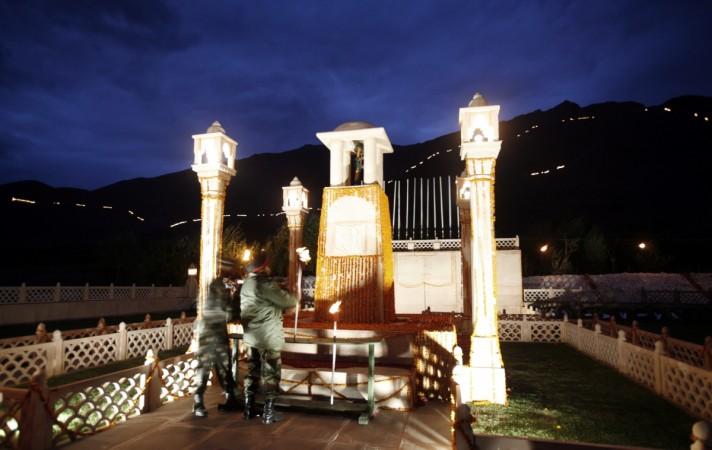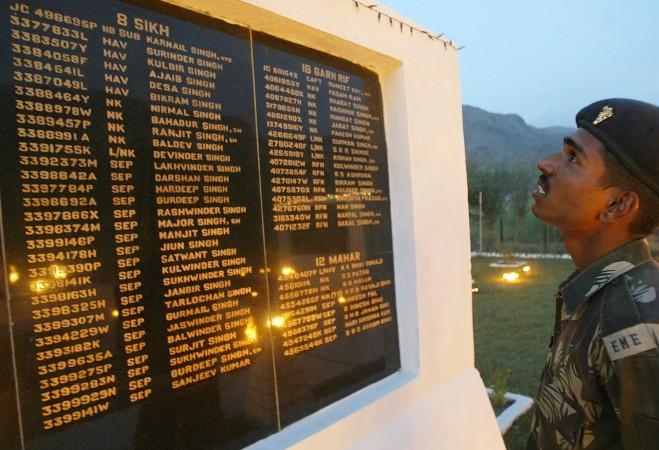
English social reformer and founder of modern nursing Florence Nightingale once said: "The martyr sacrifices themselves entirely in vain. Or rather not in vain; for they make the selfish more selfish, the lazy more lazy, the narrow narrower." It's been 19 years since the Indian Army lost over 500 soldiers – as per official figures – in the Kargil War, but the armed forces haven't forgotten their glorious and valiant brothers in arms, and neither has the nation.
India observes the Kargil Vijay Diwas on July 26 each year, honouring the men who were martyred in the 1999 war with Pakistan. This was the day that the army declared the two-month mission successful, but it came at a high price. The Indian Army organises several events and functions to remember those who were killed and the prime minister pays homage to the soldiers at Amar Jawan Jyoti at India Gate.
The forces also pay homage at the Kargil War memorial in Dras. The memorial has a sandstone epitaph, which has the names of all the Indian army personnel, who laid their lives during the Kargil war.

What went down during the Kargil War
- In the first week of May 1999, the Indian Army is said to have received information of a few infiltrators from across the border coming into Kargil and occupying an area.
- They were mostly thought to be Mujahideen, but the infiltrators later turned out to be the personnel of the Pakistan Army.
- The intruders had occupied key positions in Kargil, which gave them an upper hand when it came to the war.
- The intrusions were reportedly organised by the then Pakistan army chief General Pervez Musharraf, and was a secret mission even hidden from then prime minister Nawaz Sharif.
- The Indian Army then spoke to local shepherds who gave them vital hints on where these intruders were camping and which regions needed to be sealed to prevent more infiltrations.
- The armed forces then launched "Operation Vijay."
- The war went on for two months and huge casualties were reported from both sides.
- The Indian Air Force then stepped in with Operation Safed Sagar to support the army and Pakistan even shot down two Indian fighter jets.
- Pakistan also took a number of Prisoners of War, which included Saurabh Kalia – tortured and killed in Pak's custody – and Kambampati Nachiketa, who was repatriated a week after he was captured.
- In tune, the Indian Navy launched Operation Talwar and prepared to block Pakistani ports that eventually cut off oil supplies to the country.
- Such was the impact that Sharif later disclosed that Pakistan was left with fuel that would sustain only for six days if a full-scale war broke out.
- Strangely, Pakistan then requested the United States to step in to sort out the issue. Through this, Pakistan is known to have tried to garner international attention to the Kashmir dispute, hoping for a faster solution.
- However, the then president Bill Clinton refused and said that the US would not intervene unless Islamabad withdrew its troops from the Line of Control.
- Pakistan was then forced to withdraw its troops, after which the Indian armed forces struck the remaining outposts, thus taking back its territory and declaring Operation Vijay a success.
- While Pakistan consistently denied that its army was involved in the incursion and said that India was battling Kashmiri freedom fighter, it later awarded many of its personnel gallantry awards for the war.
Indian gallantry awards
- Grenadier Yogendra Singh Yadav, 18 Grenadiers, Param Vir Chakra
- Lieutenant Manoj Kumar Pandey, 1/11 Gorkha Rifles, Param Vir Chakra (Posthumous)
- Captain Vikram Batra, 13 JAK Rifles, Param Vir Chakra (Posthumous)
- Rifleman Sanjay Kumar, 13 JAK Rifles, Param Vir Chakra
- Captain Anuj Nayyar, 17 JAT Regiment, Maha Vir Chakra (Posthumous)
- Major Rajesh Singh Adhikari, 18 Grenadiers, Maha Vir Chakra (Posthumous)
- Captain Haneef-u-ddin, 11 Rajputana Rifles, Vir Chakra (Posthumous)
- Major Mariappan Saravanan, 1 Bihar, Vir Chakra (Posthumous)
- Squadron Leader Ajay Ahuja, Indian Air Force, Vir Chakra (Posthumous)
- Havildar Chuni Lal, 8 JAK LI, Vir Chakra. He was also awarded the Sena Medal for gallantry and posthumously awarded Ashoka Chakra as a Naib Subedar.
Aftermath of the war
The war saw a sudden surge of patriotism and the military spending found an important place in the Union budget. The Indian government also severed diplomatic ties with Pakistan. India then completed the fencing of the entire LoC, which was earlier stalled by Pakistan.

The country hasn't forgotten the sacrifices made by the soldiers of the Indian armed forces. As the saying goes: "Our flag does not fly because the wind moves it, it flies with the last breath of each soldier who died protecting it."














